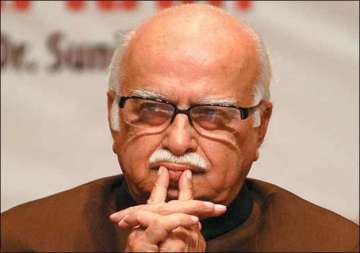Doesn't LK Advani deserve better?
Very quietly, a very important thing happened in the BJP on July 20 when L.K. Advani was not invited to participate in the NDA meeting although he has been its working chairman for a long

Very quietly, a very important thing happened in the BJP on July 20 when L.K. Advani was not invited to participate in the NDA meeting although he has been its working chairman for a long time.
The cardinal mistake committed by Advani has been his failure to go by the dictum that a person should quit when others implore him not to quit. Instead he has willy nilly created a situation when many of his party members are wondering why he is not quitting.
At a BJP national executive meeting some time back, Advani did not, or rather was not allowed to, speak. More galling for the octogenarian leader was the BJP's decision not to invite him at all to the foundation day celebration of the party on April 3. Obviously, Advani would have done better had he followed Atal Bihari Vajpayee's example of voluntarily retiring from active politics at a much earlier date.
However, as one of the founders of the BJP, Advani certainly deserves better treatment from not just his party colleagues but also the Rashtriya Swayamsevak Sangh (RSS) as he is perhaps the forerunner of much of the postulates on which the BJP under Narendra Modi's leadership could secure the thumping victory in the last Lok Sabha elections.
The real reason behind Advani becoming a fall guy in the BJP is his ideological difference with the RSS, which he first openly articulated by his praise of Mohammed Ali Jinnah. It was certainly a calculated move to broaden the BJP's political base. But the RSS had failed to pick up the point and, living in the old world of its own, it immediately set about isolating not only Advani but Jaswant Singh as well who had also written in the same vein.
Advani's fate was further sealed when the BJP, under his leadership, failed to capture power during the 2009 parliamentary elections. After that, and to stem the cacophony of differences among the second-rung leadership of the BJP, Advani had tendered his resignation as leader of opposition in the Lok Sabha but again made the fatal mistake of withdrawing it. Had Advani stuck to his decision, his departure would have been more graceful now.
In spite of the hard line Hindutva image which Advani has acquired in his political career - first in the Jana Sangh and then in the BJP - it should be admitted that he is basically a secular man. It is true that his Rath Yatra in the 1990s and his association with the chain of events leading to the destruction of the Babri Masjid are two blots not only in his political career but in his persona too. Still he has been unable to efface them, although they gave his party rich political dividends in elections. From two Lok Sabha seats in 1984 the BJP became the single largest party in 1996 by riding on the strident Hindutva hype which Advani had generated in the 1990s.
Yet, it was the same Advani who, as the deputy prime minister in 2003, had refused a Viswa Hindu Parishad demand to enact a law for constructing a Ram Mandir on the disputed site in Ayodhya, realizing fully well that it would make him unpopular in the Sangh Parivar. “We are not ready to bring legislation to build Ram Mandir at the disputed site in Ayodhya since it will create a division in the society. A real solution lies in an agreement between the two communities...” Advani had said at that time.
The reason behind was Advani's realization that with an increasing number of voters of the new generation, the BJP's exclusivist image may not take it to an electoral triumph in the near future and it was necessary to endear the party to the new generation of people who can be described as scions of globalization. He was also aware that the Mandal Commission had fundamentally changed the society - different classes would now vie for their respective places in the Indian political structure. To keep the BJP relevant in such a scenario, he had floated the idea of social engineering in 1993 whose concrete form was his concept of ‘broader Hindutva' by which he hoped to bind various disparate social classes under one BJP umbrella.
Today, with other backward class (OBC) people like Narendra Modi as the prime minister and Shivraj Singh Chouhan as the chief minister of Madhya Pradesh, the BJP's Brahmin-Bania based former narrow social base stands widely extended. But it would be a mistake if the party does not acknowledge Advani's contribution to this.